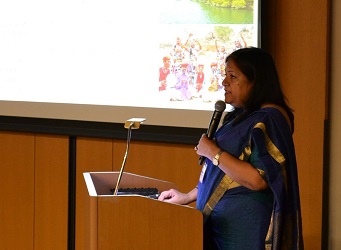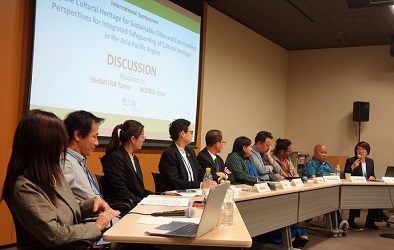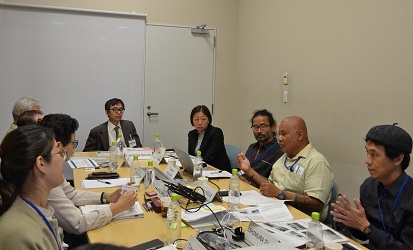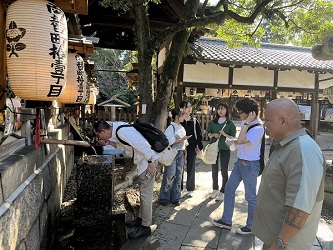NEWS
21/11/2024
International Symposium ‘Intangible Cultural Heritage for Sustainable Cities and Communities: Perspectives for Integrated Safeguarding of Cultural Heritage in the Asia-Pacific Region’ and related events were held in Kyoto (10-12 October 2024)
As the final event under the research project ‘Research on ICH Contributing to SDGs: Intangible Cultural Heritage for Sustainable Cities and Communities (FY 2022–2024)’, IRCI held the international symposium ‘Intangible Cultural Heritage for Sustainable Cities and Communities: Perspectives for Integrated Safeguarding of Cultural Heritage in the Asia-Pacific Region’ on 11 October 2024 in Kyoto.
The symposium featured two keynote speeches and four case reports. The first keynote by A. Bhattacharya (Contact Base) highlighted the intangible cultural heritage (ICH) practices and the heritage tourism at the Indian World Heritage site of Santiniketan, whereas S. Shimizu (Kyoto Institute of Technology) introduced the cultural landscape of tea in Uji, Kyoto, with challenges associated with maintaining its heritage value. The case reports included the result of research implemented under this project, namely, the rattan handicraft production in Angkor, Cambodia, maritime landscape and traditional navigation in the Marshall Islands, and George Town Heritage Celebrations in Malaysia, as well as the case of community-based safeguarding of traditional knowledge in Kyrgyzstan. The final discussion session started by reminding the differential orientations between the World Heritage Convention and the Convention for the Safeguarding of the Intangible Cultural Heritage, and then, focused on the synergy and interconnectedness between the tangible and intangible heritage, and the active roles of ICH in the integrated heritage safeguarding and management. Notably, it was highlighted that the holistic understanding of heritage as a system would be important for mobilizing ICH for safeguarding the community’s heritage and that we would have to move away from the categorizations dividing heritages. Recognizing that cultural heritages connect people and contribute to their identity, it was considered important to constantly respond to new challenges to give cultural heritage a new meaning. It was also raised that the concept of authenticity, which has been considered under the World Heritage Convention, should be renewed from the community’s viewpoint and in terms of the framework of ICH.
The symposium was attended by about 50 participants, including the project partners, presenters, ICH researchers, and graduate students. Experts from the UNESCO Category 2 Centres in the Republic of Korea (International Information and Networking Centre for Intangible Cultural Heritage in the Asia-Pacific Region: ICHCAP) and Mongolia (International Institute for the Study of Nomadic Civilizations: IISNC) also participated in the event as observers.
On 10 October, the day before the symposium, the project partners’ meeting was held to share the results of the case studies conducted in Cambodia, Malaysia, and the Marshall Islands and to discuss the final project outcomes. On the following day of the symposium, 12 October, participants enjoyed an excursion programme that was developed in cooperation with the students of the Doshisha Women’s College of Liberal Arts (DWCLA) as part of the Project Based Learning Class led by Professor H. Onish. Four excursion themes were carefully selected by the DWCLA students through their consideration of how ICH in Kyoto is safeguarded and utilized from their viewpoints, and was operated in two separate courses: Course A to experience the garden soundscapes and Manga/Anime culture; whereas Course B to explore the role of water in Fushimi area and a popular tourism collecting goshuin (seal stamps) of temples and shrines. The news of the excursion has been disseminated on the DWCLA website in Japanese.
A video recording of the symposium will be made available on IRCI’s official YouTube channel in due course.
Reflecting the discussions at the project partners meeting and the final symposium, the final project report will be published in March 2025.

Keynote speech of the international symposium by Ms Bhattacharya

Discussion session of the international symposium

Project partners’ meeting on 10 October

A part of excursion programme at Gokounomiya Shrine, Fushimi, Kyoto
- ARCHIVE
- CATEGORY
- Research Data Collection
- Creation of Research Forum
- SDGs
- Climate change
- Natural hazards
- COVID-19 Pandemic
- Endangered ICH
- Post-conflict
- Legal systems
- Documentation
- Conferences/Meetings
- Seminars
- Symposiums/Forums
- Workshop/Working sessions
- Field research
- Information
- Visits
- Publications
- YouTube
- C2Centre
- UNESCO
- Cooperation-with-Sakai-city
- Governing Board Meetings
- Others



